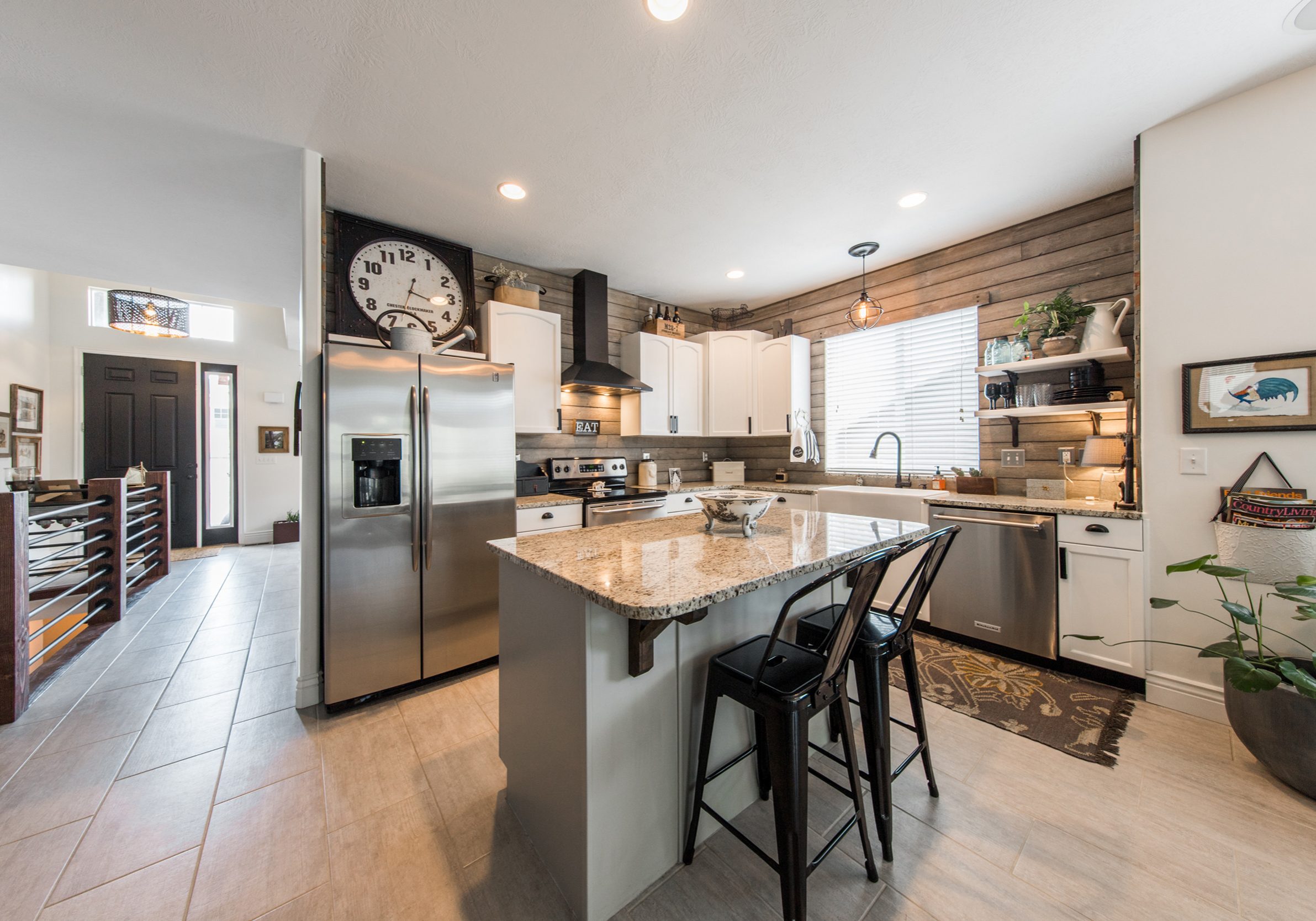Are you ready to sell?
SELLING PROCESS
If you’re in the market to sell, it’s probably time to clean house. Literally. Selling a home requires preparation, patience, and in most cases, good-old-fashioned elbow grease. From list to closing, we’ll walk you through the most important steps and terminology.
The job of a full-service real estate agent is to represent your best interests through every step of the sales process. Your agent should listen to your needs and understand the market in which you are selling a home. They should be experts in marketing, negotiation, transaction forms, and finance options, as well as have an understanding of technology and how it can enhance the marketing of your home.
Determining the right price is hands-down the most important part of achieving the highest return in the least amount of time. There are a lot of factors that go into determining a home’s market value, such as the sales price of nearby homes that have recently sold, the listing price of similar homes that are currently on the market, as well as the condition and location of a home. In order to determine pricing, your Windermere agent will provide a comparable market analysis which walks you through what your home is worth – and why.
First impressions are key when selling a home, so before the ‘for sale’ sign goes up, put in the time to make sure it’s in ship shape. Fresh paint, clean closets, and cheery flowers – there’s a lot you can do to make even the most humble of abodes look like a million bucks. Check out our Get Ready To Sell checklist for a list of ideas and tips.
Creating a plan to market your home will help attract the interest of the right buyer. Today, the vast majority of homebuyers use the internet in their home search, so your marketing plan should include focused online activities, in addition to print advertising and open houses.
Showings are an inconvenient, yet necessary part of the home selling process. When your home is on the market it has the potential to be shown at any time, so it's important to maintain a certain level of cleanliness; clear dishes from the sink, make beds, put away dirty laundry, and vacuum and dust regularly. It's also a good idea to clear out; it makes buyers uncomfortable to tour a home when the owners are in the next room, so for the sake of your sale, vacate your home for showings.
Once an offer on a property has been made by a buyer and accepted by the seller, they enter into a legal contract known as a Purchase and Sale Agreement. This document outlines the specific terms and conditions of the transaction and is acknowledged by both parties by the signing of the document.
Whether you’re a buyer or a seller, negotiation is the key to getting the best deal. Negotiations can involve everything from settling on a sales price to concessions and financing. Windermere Real Estate agents are expert negotiators whose job it is to represent your interests during the give and take of a real estate transaction.
Once a buyer and seller reach mutual acceptance on a property, a home inspector is hired to investigate every nook and cranny to determine if the home is in need of any repairs. An inspector will check items, such as the roof, basement, heating system, water heater, air-conditioning system, structure, plumbing, and electrical. Afterwards, buyers will have a chance to negotiate with the sellers to cover the costs of certain repairs or to ask for concessions.
Once the offer is accepted and a closing date agreed upon, escrow allows the buyer and the seller to have an outside party ensure all parts of the contact are complete. Your Windermere agent can help coordination the completion of all necessary forms to the escrow company and monitor the escrow process until the transaction is complete.
At closing, all the paperwork is signed by the buyer and seller, both parties pay any settlement fees and the documents are officially recorded. Prior to closing, you'll receive a settlement statement outlining any fees which may apply to you. After closing is finalized and recorded, the home is yours!

GETTING READY
You’ve made the decision to sell. So, now what? Every house is as unique as the person who owns it, but when you put your home on the market, there are some universal truths you should abide by if you want to make even the most humble of abodes look like a million bucks.
It all starts with the “3 C’s”: curb appeal, clutter (as in de-clutter), and cleanliness. The list below will walk you through this and everything else you need to know about getting a home in ship shape for selling. Remember, your Windermere agent is an expert on this subject, so take advantage of that resource when the time is right.
STAGING TO SELL
As the saying goes, first impressions are everything. And the same holds true when selling your home. Beyond making sure that your home is squeaky clean, staging can be the difference between boring and breathtaking.
Staging highlights your home’s best features and helps minimize any drawbacks. It allows buyers to feel comfortable and visualize themselves in your home without distraction. This is especially important if it is not occupied because an empty home has a difficult time communicating its potential to prospective buyers. When staging your home, you can either hire a professional stager or simply make adjustments to your own décor using the following guidelines.

When preparing your home for sale, think about why you fell in love with your home in the first place, and what you still love about it. Did the entryway feel particularly welcoming? Do you love the flow of the living spaces? Perhaps it’s how the sunlight pours into the kitchen? Enhancing and highlighting these details can help evoke the same feeling for prospective buyers. Another useful tactic is to look at your home through the eyes of a buyer; it’s this process that is sometimes hard for sellers and why hiring a professional home stager can be the way to go. If hiring someone is out of the question, you can also look to your real estate agent for help with this process; they don’t have a sentimental attachment to your home, so it’s easier for them to provide an objective opinion.
You may love your bright red accent wall or colorful art collection, but potential home buyers may not. Before showing your home, you will want to make an effort to tone down loud colors and create something of a blank canvas so buyers can better envision themselves—and their things—in your home. Kids' rooms are no exception; you may want to avoid overly gendered or bold colors in bedrooms and bathrooms. A future homeowner may not have children or may see the space as an office or guest room, so showcasing rooms in a versatile light is best. Keeping it neutral applies to smell too. Don’t overpower your home with heavy scents using air fresheners or potpourri, but at the same time, you don’t want your closet smelling like sweat socks, so use your best judgment.
It’s time to clear out the clutter. You may not think of family photographs or books and trinkets as clutter, but to the prospective buyer, they’re exactly that. As such, all personal and superfluous items should be stored away—offsite if your home’s storage is at a premium. Excess furniture can make a room feel cluttered too, so it’s a good idea to store, sell, or give away surplus or bulky furniture. Bookcases should be thinned out and closets cleared to the point of almost being empty. Any religious memorabilia or political ideologies should also be absent from your home so as to not offend a prospective buyer who may not share your same beliefs. Once your home is staged, it may not feel as functional or personal, but it will do a better job of showcasing the space for buyers.
Another important element is the lighting. Bright, well-lit houses seem more spacious and cheerful. During the day, all the curtains and drapes should be open. If the view is unappealing, you can simply purchase sheer window coverings that let light through, but mask the view. Another way to brighten up your home is to turn on all the lamps, even during the day. And don't forget about hallways, closets and stairways—they too need their share of light.
You don’t want to remove all the personality from your home; rather you want to showcase the space in the best possible light while making it feel welcome and comfortable. You may want to rearrange furniture to fit the rooms better, de-centralize the television, pull furniture away from the walls, or create cozy spaces to invoke a certain feeling or environment. Staging is especially important if the home is not occupied because an empty home has a difficult time communicating its potential to prospective buyers. In fact, studies show staged homes typically sell faster (and for more money) than empty homes, so consider rental furniture to fill the space and give it a sense of hominess.
- Go through your home room-by-room and make changes holistically for each space.
- Store any unnecessary objects and personal items (off-site if possible).
- Group furniture in a way to make rooms feel more spacious.
- Clean up closets, cabinets, and other built-ins to make spaces look larger and more organized.
- Paint over bold wall paint with more neutral colors to appeal to a larger audience of buyers.
- Well-lit homes are more inviting; the right lighting also makes rooms appear more spacious.
- Enhance your home’s greatest assets and minimize the drawbacks.
- Look for opportunities to repurpose or reorganize spaces into usable rooms (i.e., convert storage space into an exercise studio).
- Make a special effort in bedrooms and bathrooms with nice linens; this makes rooms feel more intimate, polished, and appealing to potential buyers.
- Stage your dining room for a dinner party with table linens, dishes, silverware, and other table décor (i.e., candle sticks, flowers, etc.).
- Replace old curtains, cushions, and area rugs (you can find inexpensive replacements at discount stores and thrift shops).
- Keep counters clear of clutter; remove drying racks, fridge magnets, drinking glasses, toothbrush holders, and anything else that can be distracting to the eye.
- Remember, when staging a home, less is usually more!
At closing, all the paperwork is signed by the buyer and seller, both parties pay any settlement fees and the documents are officially recorded. Prior to closing, you'll receive a settlement statement outlining any fees which may apply to you. After closing is finalized and recorded, the home is yours!


